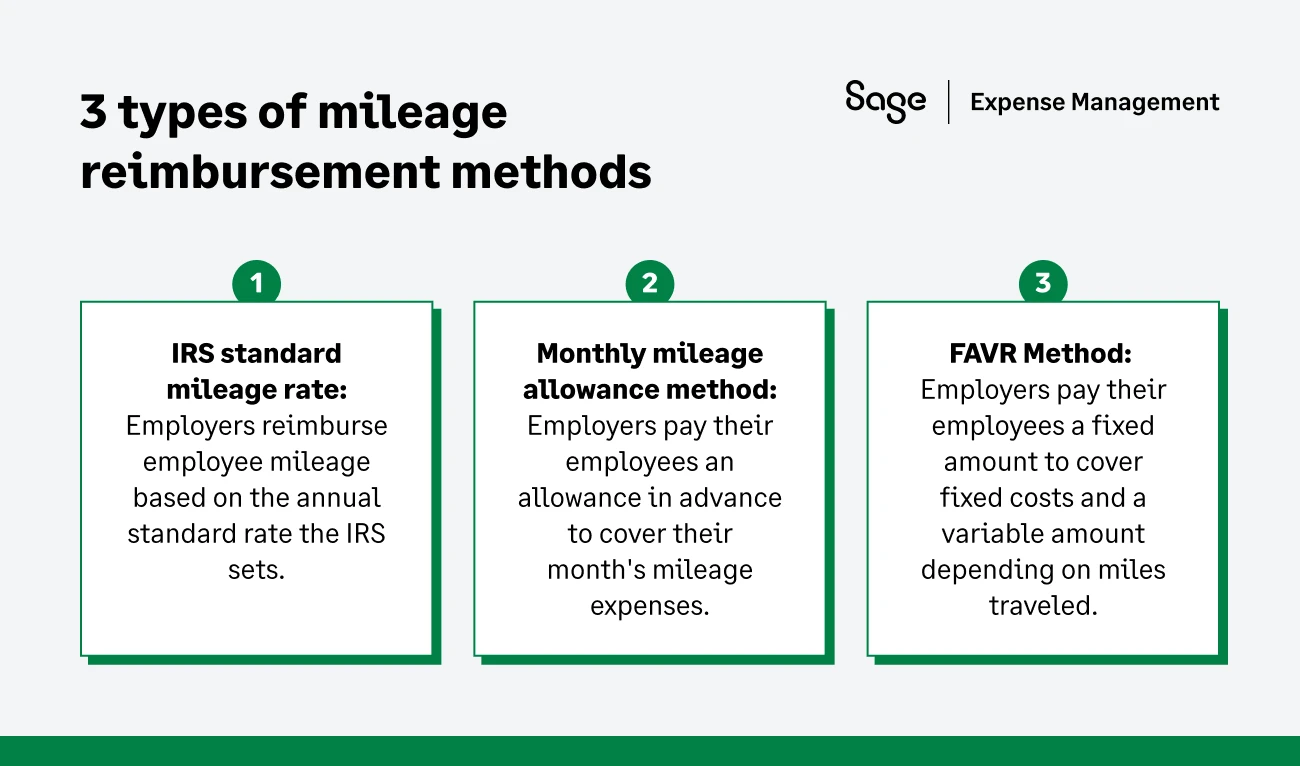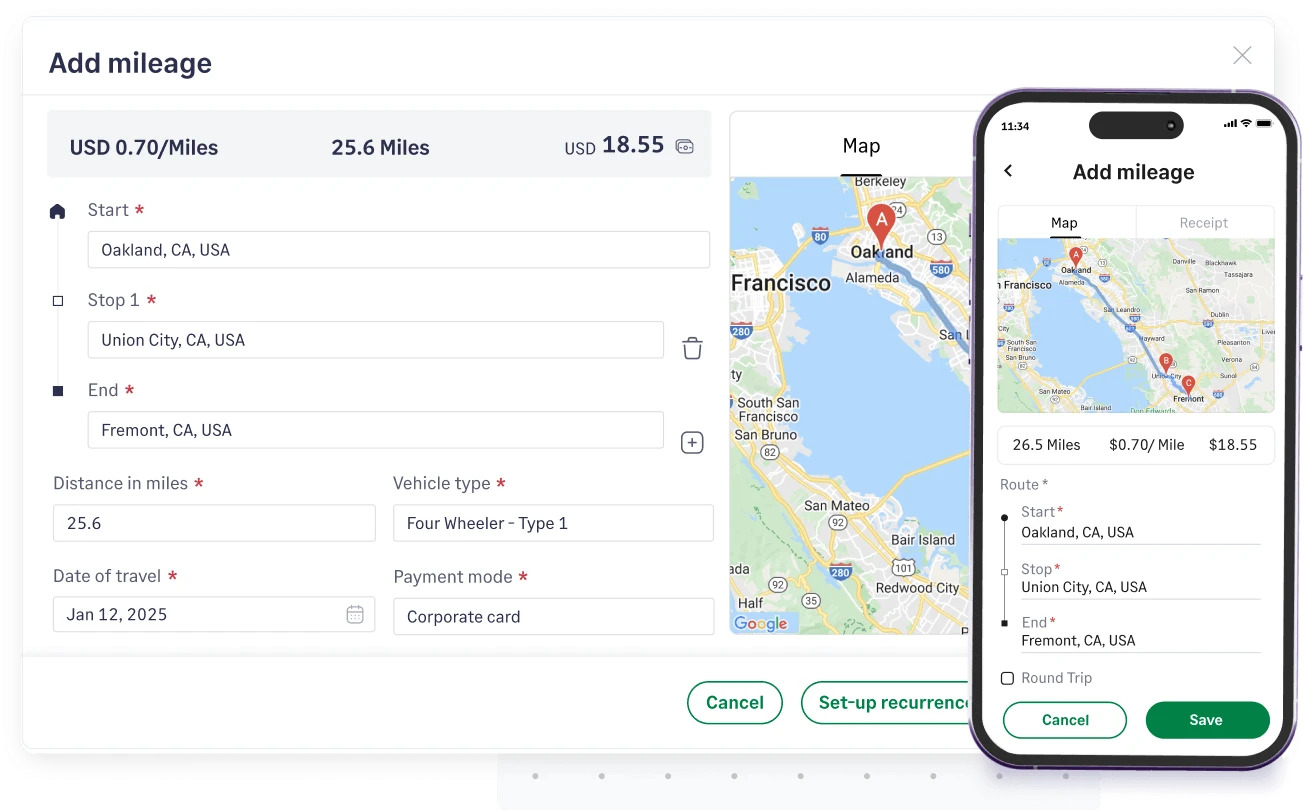Mileage reimbursements today become rarer by the day with the adoption of remote work and the fading out of the concept of company vehicles. However, in a fast-paced business environment, these instances must be addressed if the need arises. The problem is, understanding the IRS rules for mileage reimbursement can be confusing due to their many details and complexities.
So, here’s your go-to guide on mileage reimbursements in the US. We will go over everything from what mileage reimbursement is to how the laws around it work, the latest IRS information, and the best way to manage it. Let’s start with the basics—what is mileage reimbursement?
What Is Mileage Reimbursement?
Mileage reimbursement is when employers compensate employees for using their vehicles for business purposes. It is calculated based on the miles run and includes any vehicle-related expenses they incur while carrying out a business operation.
For example, if an employee is asked to drive to a client’s office from the main office or another location for a business meeting, they qualify for mileage reimbursement.
What Is Considered as Business Mileage?
Simply put, business mileage refers to the total distance traveled for business-related purposes, for which you can be reimbursed. Let’s examine a few instances to understand what counts and doesn’t count as business mileage.

Here’s what DOES count:
- Traveling from your normal office location to a secondary office.
- Traveling for client meetings or business conferences.
- Traveling from your home to a temporary office.
Here’s what DOESN’T count:
- Daily commute from your home to your normal office.
Please note, if you are a self-employed or independent contractor, and your home is where you work out of, your home qualifies as an office, and you can deduct mileage between your home and another work location as long as it’s for the same business.
Mileage is not the only business expense you should keep track of. Check out all the other business expense categories here.
Is Mileage Reimbursement Taxable?
In general, mileage reimbursements are not taxable if they follow IRS rules (which we will get to in a bit). But, if the employer reimburses based on a flat rate higher than the IRS rate, you might owe tax on the extra amount.
Self-employed or independent contractors can deduct business mileage expenses from their taxes, while companies can account for them as business expenses.
What Was the 2024 Federal Mileage Reimbursement Rate?
Here are the mileage rates for the year 2024:
- 67 cents per mile for self-employed individuals and business use, up 1.5 cents from 2023.
- 14 cents per mile for charitable purposes (unchanged).
- 21 cents per mile for medical and moving purposes (for qualified active-duty military personnel).
What Is the Federal Mileage Reimbursement Rate for 2025?
According to the IRS, the mileage rate is set yearly “based on an annual study of the fixed and variable costs of operating an automobile.”
Here are the mileage rates for the year 2025:
- 70 cents per mile for self-employed individuals and business use, up 3 cents from 2024.
- 14 cents per mile for charitable purposes (unchanged).
- 21 cents per mile for medical and moving purposes (for qualified active-duty military personnel).
What Are the IRS Mileage Reimbursement Rules?
Let's divide the IRS mileage reimbursement rules among employers, employees, and self-employed individuals.
Employers
Understanding the IRS mileage reimbursement rules is crucial for employers, especially in states like California, Massachusetts, and Illinois, where reimbursement is mandated. While federal laws don't enforce mileage reimbursement, it's a practice that can foster a positive employer-employee relationship. However, failing to reimburse work-related mileage expenses could lead to legal consequences if it causes the employees' net income to fall below the federal limit.
As an employer, you have the flexibility to choose the reimbursement method that best suits your company's policies and your employees' needs. You can opt for the IRS standard mileage rate of 70 cents (the rate for 2025) or set your own flat rate, which can be higher or lower than the standard IRS rate.
Your employees simply need to provide proof of the mileage driven for business purposes, either through a mileage log or a mileage tracking app. The advantage of reimbursing your employees is that these reimbursements are tax-deductible.
There are also other methods of reimbursement for mileage to your employees—you can provide mileage allowances or reimburse them based on Fixed And Variable Rates (FAVR).
What Is the Monthly Mileage Allowance Method?
Mileage allowances are paid to the employee in advance so they can use them for the month's business mileage expenses.
What Is the Fixed and Variable Rates Method?
With the FAVR method, you pay your employees a fixed cost (insurance, depreciation, and more) and a variable cost (fuel, oil, and more), generally a cents-per-mile rate.

Employees
If you're an employee, you are eligible for mileage reimbursement from your employer if you use your vehicle for business requirements. But, as mentioned earlier, no federal laws force employers to reimburse your mileage expenses (unless state laws require them).
Your employer can also choose which method they want to reimburse you. There are two things you as an employee need to keep in mind:
- Keep a detailed log of all your business mileage expenses - the date, miles traveled, locations, and the purpose of travel. Do check with your employer if they require more information.
- Ensure the mileage reimbursement you receive for each mile shouldn't exceed the IRS mileage rate regardless of how you're reimbursed. The reimbursement will be seen as added income and taxed accordingly if it does.
Self-employed
Things are different if you are self-employed. If you use the vehicle purely for business purposes, you can deduct all expenses associated with it. But if it's a mixed-purpose vehicle, you can only deduct the expenses you accrue during business use.
There are two methods of calculating mileage for tax deductions - the standard mileage rate method and the actual expense method (explained in more detail below).
In short, with the standard mileage method, you calculate the mileage based on the standard rate provided by the IRS to determine your deduction.
With the actual expenses method, you deduct the actual costs of using your vehicle for business purposes. These include gas, maintenance, repairs, depreciation, and other related expenses. The latter is more complex and needs thorough record-keeping.
What Records Do You Need for Mileage Reimbursement?
According to the IRS, here’s everything you need to record to ensure you get reimbursed accurately:
- Date
- Destination
- Purpose of travel
- Odometer readings (start, stop, and miles traveled)
- Type of expenses incurred
- Expense amount paid
Your employer might require more information depending on their reimbursement policy, so please check with them in advance. Here’s an example of a daily business mileage and expense log according to the IRS:

{{mileage="/cta-banners"}}
How Do You Calculate Your Mileage Reimbursement?
Standard Mileage Method
Calculating your mileage reimbursement is very simple when following the IRS standard reimbursement rules.

It’s best explained through an example: If you’ve traveled 350 miles in a month, and 150 of them are business miles, you can calculate your mileage by simply multiplying the business miles traveled by the standard IRS rate for the year (70 cents/mile for 2025).
70 cents x 150 business miles = $105
Following the standard mileage method, you can deduct $105 as your mileage tax deduction for the month.
Actual Expenses Method
The actual expenses method is a little more complicated and requires you to keep a record of fuel, maintenance, repairs, insurance, depreciation, and other related expenses.

If you’re following the actual expenses method, here’s how you can calculate with another example:
Assume you spend around $600 monthly on fuel, maintenance, insurance, depreciation, etc.
- Calculate the total business miles driven = 150 miles.
- Determine the business use percentage. Since you drove 350 miles, the business use percentage = (150/350)*100 = 42.8%.
- Calculate the deduction by multiplying the total actual expenses incurred (gas, maintenance, oil) by the business use percentage.
$600 * 42.8% = $256.8
Following the actual expenses method, you can deduct $256.8 as your mileage tax deduction for the month.
Read more about the standard and actual expenses methods here.
How to Manage a Mileage Reimbursement Policy?
Now that you understand mileage reimbursement and how it should be calculated, it’s time to look at it from an organizational standpoint. As an employer, you should create a clear mileage reimbursement policy that your employees can follow.
It should include everything from mileage rates and what expenses can be reimbursed to what records are required from the employees and how they can keep track of them.
Here are a few tips on how you can create and manage mileage reimbursements in your business:
- Communicate your organization’s mileage reimbursement policy effectively - how to track it, what rules they have to follow, whom to contact in case of any issues, and how the reimbursement will be paid out.
- Request your employees to record all the trips they take for business purposes. The records should include the date, total miles driven, odometer reading before and after the trip, the purpose of the trip, and any other expenses incurred.
- Automate the tracking and reimbursement process with an easy-to-use mileage tracker software that can automatically track distance traveled, record the purpose of visits, deduct commuting miles, enforce policies, and help employees easily stay on top of their mileage reimbursements.
Check out our list of some of the best business mileage tracking tools in 2025 here.
Why Use Sage Expense Management (formerly Fyle) to Track and Manage Mileage Reimbursements
Tracking and managing employee mileage reimbursements can be cumbersome, but you don’t have to do it manually. Sage Expense Management is a complete mileage tracking and expense management tool built to simplify the process from accurately tracking mileage to reimbursing them on time. Here’s how it helps:
Track Mileage With Ease
Sage Expense Management’s mileage tracking features are powered by Google Maps, which can help you get the most accurate readings. Just add the starting address, stops (if there are any), and destination, and it will calculate the distance and the mileage rate automatically. It doesn’t get any easier than this!

You can also set up recurring mileage expenses, add purpose of travel, add bulk mileage, and more with Sage Expense Management.
Deduct Commute Miles for More Accurate Tracking
Since travel from home to office is not included when calculating mileage reimbursement, employees can add their home and work locations. Sage Expense Management will automatically calculate one-way and two-way distances and exclude them from the tracked mileage, simplifying the commute deduction process.

Pre-submission Policy Checks
Employers can easily create and enforce policies with Sage Expense Management. For example, if you restrict mileage reimbursements to only weekdays, any weekend mileage requests will be flagged even before submission. This ensures compliance and reduces fraud.
Reimbursements via ACH
With Sage Expense Management, you can simplify employee reimbursements and ensure they receive timely payments using the ACH payment system. You can even pay out multiple employees with a single click.
Sage Expense Management also integrates with major accounting software like NetSuite, Sage, QuickBooks, and Xero to eliminate manual data exports and streamline the entire process.
FAQs Around Mileage Reimbursement
Does mileage reimbursement include gas?
Yes, gas is included if your company reimburses mileage using the IRS standard rate method. It’s not required to expense gas separately.
How do we determine reimbursement rates in a business?
There are two ways: use the standard mileage rate set by the IRS (70 cents/mile for 2025) or customize a flat rate depending on the location, gas prices, and other expenses.
What are the records required for mileage reimbursement?
According to the IRS, employees are required to keep a record of the trip’s date, the total miles traveled for each trip, the destination, and the purpose of the trip in order to qualify for mileage reimbursement.
Which is the best way to reimburse employees for mileage?
You can reimburse them based on their mileage (which is simpler to administer and manage) or the gas and other expenses incurred (proof provided).
How much should I be paid per mile?
According to the IRS, in 2025, the standard mileage rate for businesses is $0.70 per mile, $0.21 per mile for medical, and $0.14 per mile for charities.
{{mileage="/cta-banners"}}



.webp)
















